高中英语 定语从句课件(41张ppt)
文档属性
| 名称 | 高中英语 定语从句课件(41张ppt) | 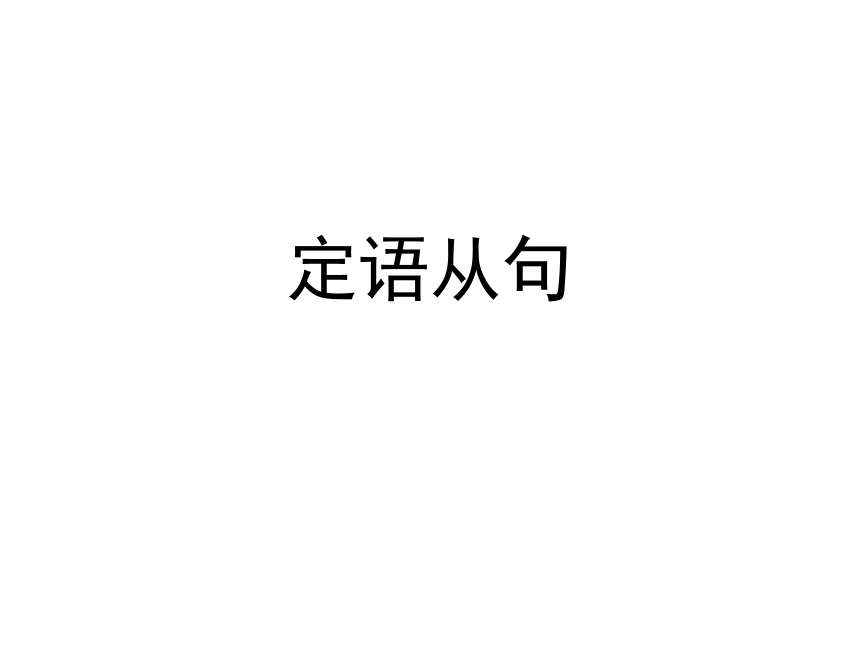 | |
| 格式 | zip | ||
| 文件大小 | 246.0KB | ||
| 资源类型 | 教案 | ||
| 版本资源 | 通用版 | ||
| 科目 | 英语 | ||
| 更新时间 | 2021-02-17 19:47:17 | ||
图片预览

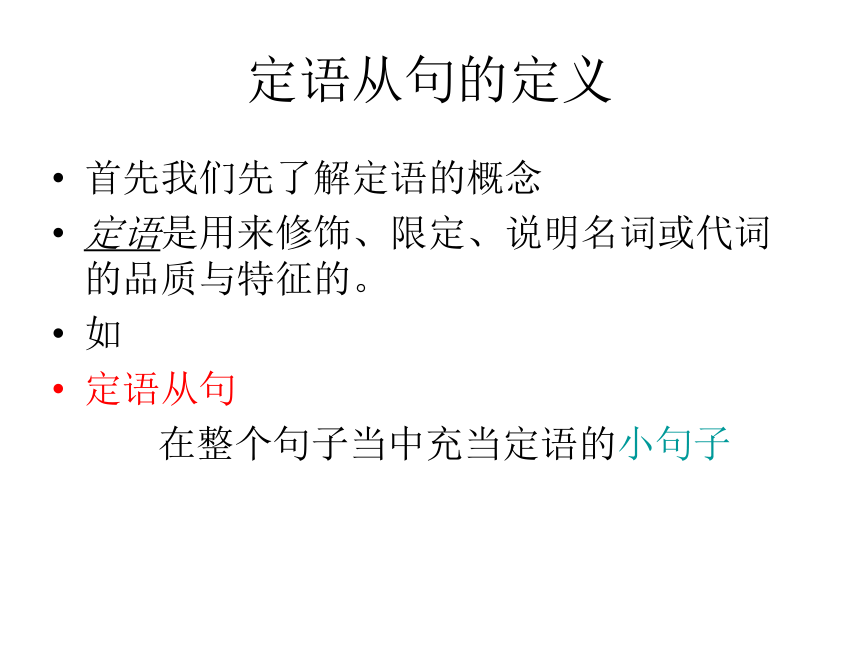
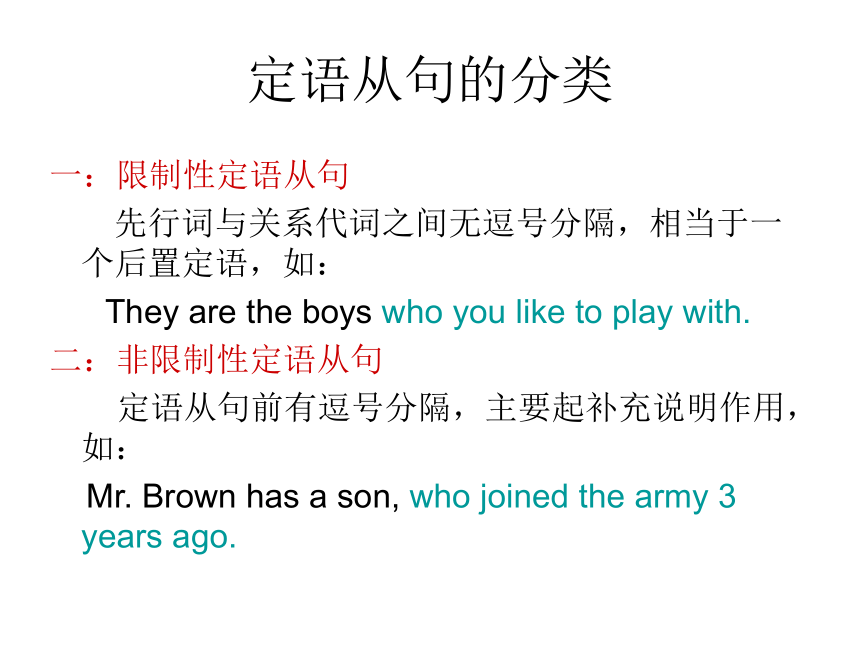
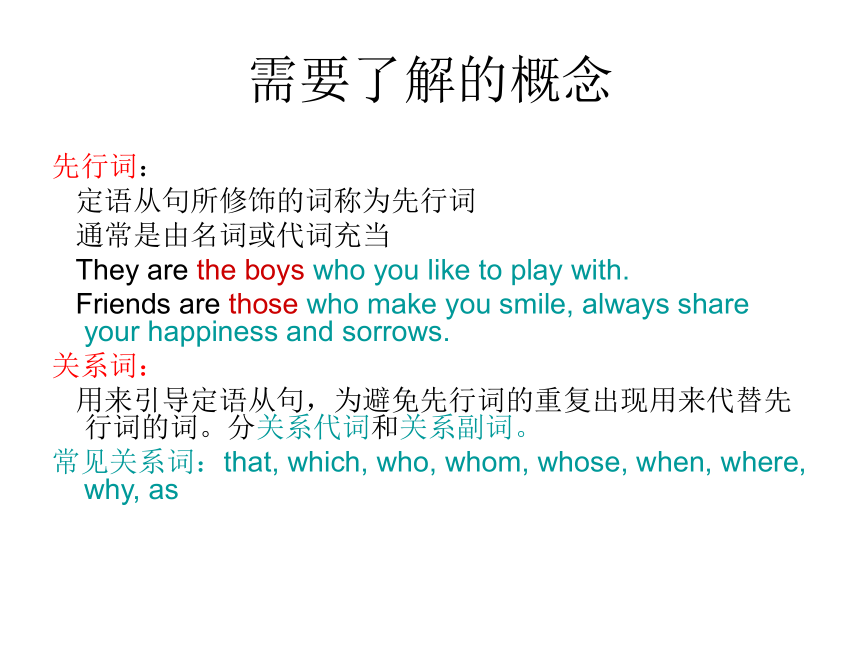
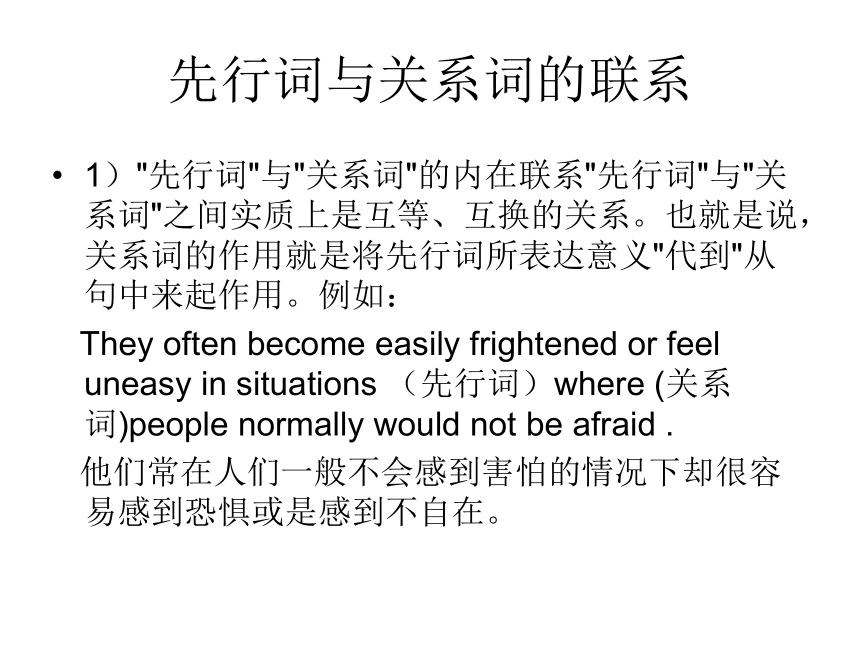
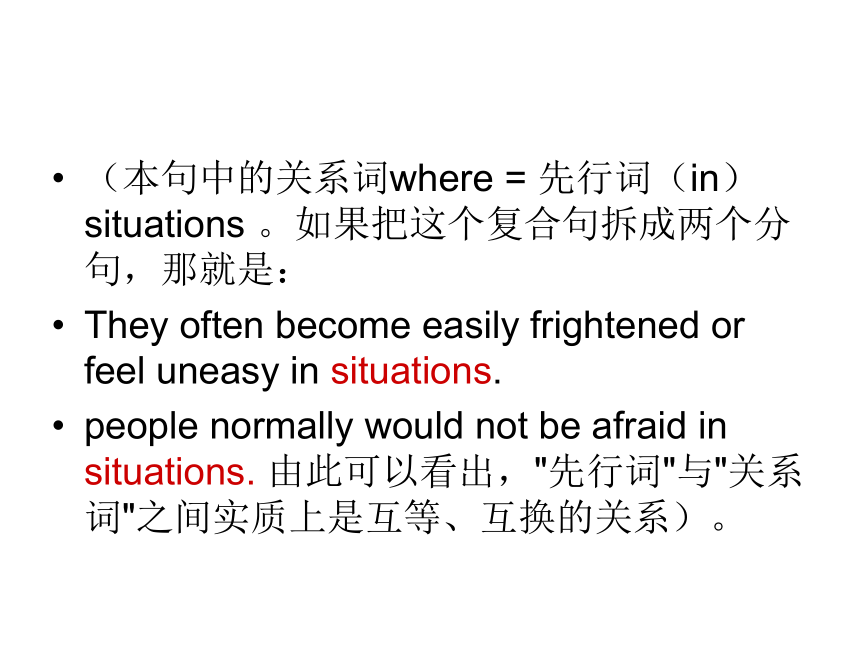
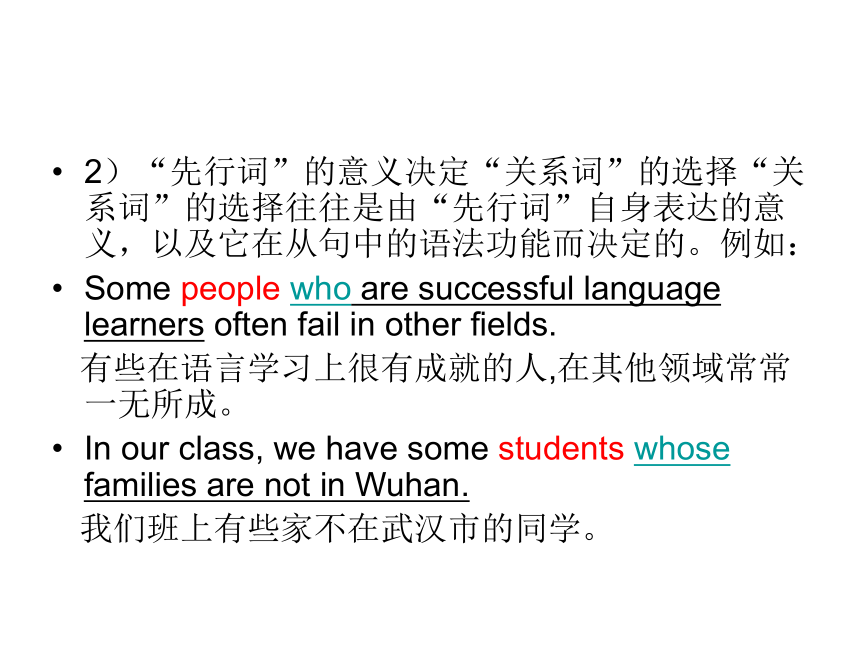
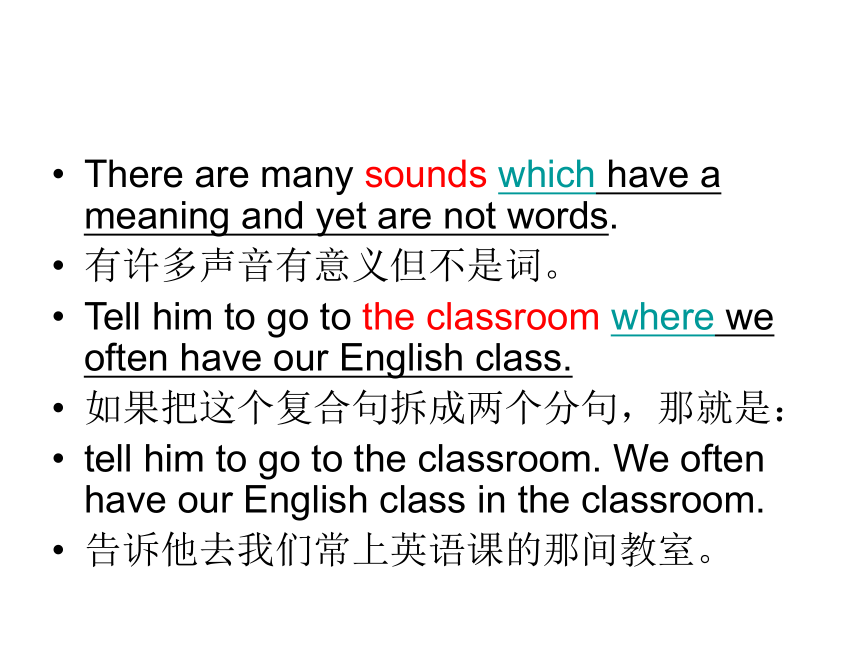
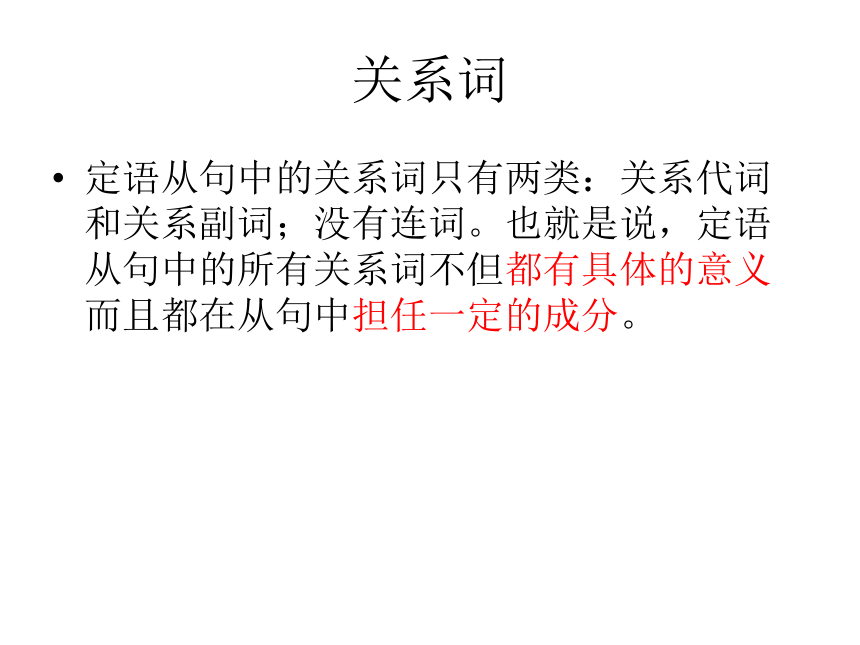
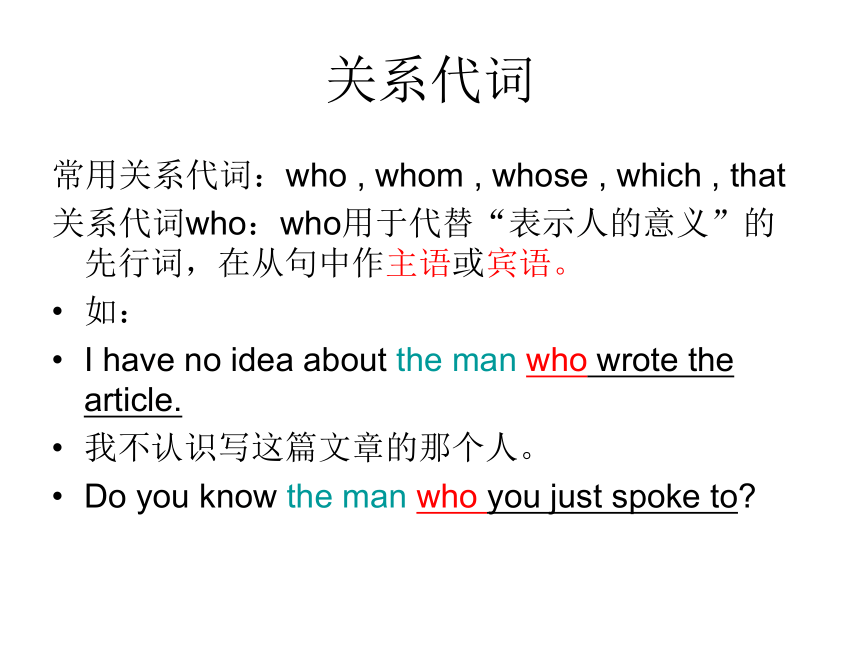
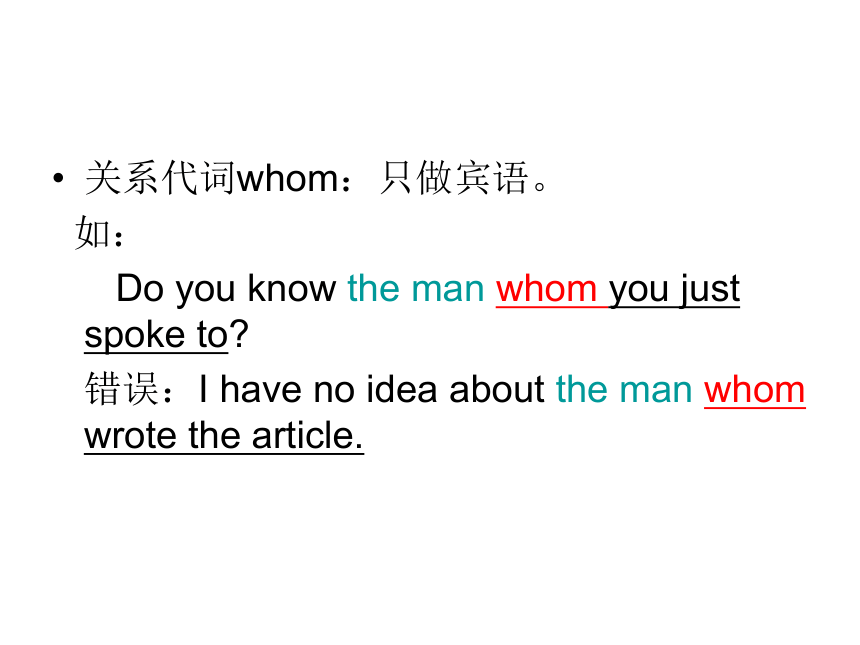
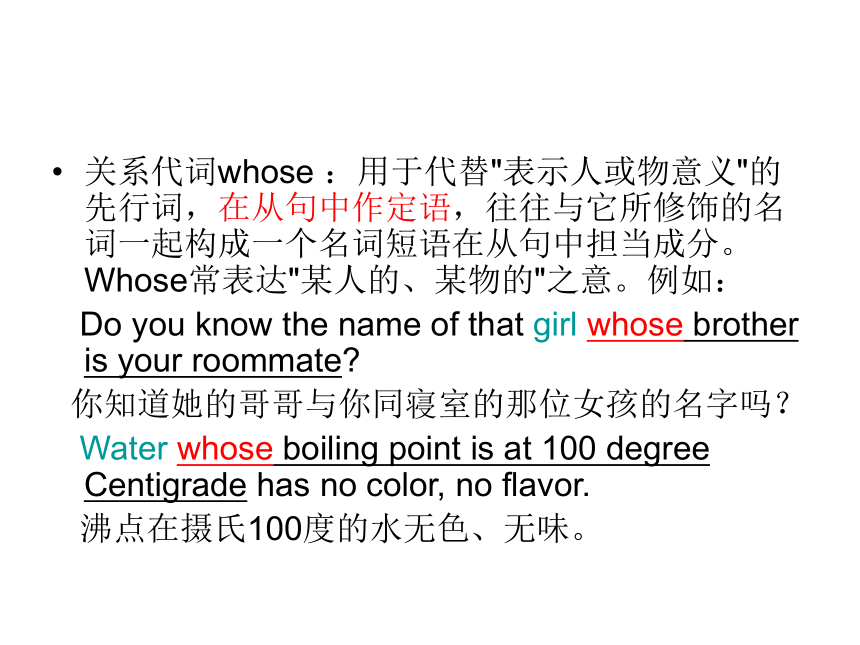
文档简介
(共41张PPT)
定语从句
定语从句的定义
首先我们先了解定语的概念
定语是用来修饰、限定、说明名词或代词的品质与特征的。
如
定语从句
在整个句子当中充当定语的小句子
定语从句的分类
一:限制性定语从句
先行词与关系代词之间无逗号分隔,相当于一个后置定语,如:
They
are
the
boys
who
you
like
to
play
with.
二:非限制性定语从句
定语从句前有逗号分隔,主要起补充说明作用,如:
Mr.
Brown
has
a
son,
who
joined
the
army
3
years
ago.
需要了解的概念
先行词:
定语从句所修饰的词称为先行词
通常是由名词或代词充当
They
are
the
boys
who
you
like
to
play
with.
Friends
are
those
who
make
you
smile,
always
share
your
happiness
and
sorrows.
关系词:
用来引导定语从句,为避免先行词的重复出现用来代替先行词的词。分关系代词和关系副词。
常见关系词:that,
which,
who,
whom,
whose,
when,
where,
why,
as
先行词与关系词的联系
1)"先行词"与"关系词"的内在联系"先行词"与"关系词"之间实质上是互等、互换的关系。也就是说,关系词的作用就是将先行词所表达意义"代到"从句中来起作用。例如:
They
often
become
easily
frightened
or
feel
uneasy
in
situations
(先行词)where
(关系词)people
normally
would
not
be
afraid
.
他们常在人们一般不会感到害怕的情况下却很容易感到恐惧或是感到不自在。
(本句中的关系词where
=
先行词(in)situations
。如果把这个复合句拆成两个分句,那就是:
They
often
become
easily
frightened
or
feel
uneasy
in
situations.
people
normally
would
not
be
afraid
in
situations.
由此可以看出,"先行词"与"关系词"之间实质上是互等、互换的关系)。
2)“先行词”的意义决定“关系词”的选择“关系词”的选择往往是由“先行词”自身表达的意义,以及它在从句中的语法功能而决定的。例如:
Some
people
who
are
successful
language
learners
often
fail
in
other
fields.
有些在语言学习上很有成就的人,在其他领域常常一无所成。
In
our
class,
we
have
some
students
whose
families
are
not
in
Wuhan.
我们班上有些家不在武汉市的同学。
There
are
many
sounds
which
have
a
meaning
and
yet
are
not
words.
有许多声音有意义但不是词。
Tell
him
to
go
to
the
classroom
where
we
often
have
our
English
class.
如果把这个复合句拆成两个分句,那就是:
tell
him
to
go
to
the
classroom.
We
often
have
our
English
class
in
the
classroom.
告诉他去我们常上英语课的那间教室。
关系词
定语从句中的关系词只有两类:关系代词和关系副词;没有连词。也就是说,定语从句中的所有关系词不但都有具体的意义而且都在从句中担任一定的成分。
关系代词
常用关系代词:who
,
whom
,
whose
,
which
,
that
关系代词who:who用于代替“表示人的意义”的先行词,在从句中作主语或宾语。
如:
I
have
no
idea
about
the
man
who
wrote
the
article.
我不认识写这篇文章的那个人。
Do
you
know
the
man
who
you
just
spoke
to?
关系代词whom:只做宾语。
如:
Do
you
know
the
man
whom
you
just
spoke
to?
错误:I
have
no
idea
about
the
man
whom
wrote
the
article.
关系代词whose
:用于代替"表示人或物意义"的先行词,在从句中作定语,往往与它所修饰的名词一起构成一个名词短语在从句中担当成分。Whose常表达"某人的、某物的"之意。例如:
Do
you
know
the
name
of
that
girl
whose
brother
is
your
roommate?
你知道她的哥哥与你同寝室的那位女孩的名字吗?
Water
whose
boiling
point
is
at
100
degree
Centigrade
has
no
color,
no
flavor.
沸点在摄氏100度的水无色、无味。
关系代词which:
用于代替"表示事物意义"的先行词,在从句中作主语、宾语。例如:
Views
which
are
entirely
new
or
foreign
may
also
be
hard
to
accept.
(做主语)
那些全新的或是来自国外的观点或许也很难被接受。
I've
got
a
novel
which
you
may
like
to
read.
我有一本你或许想看的小说。(做动词read的宾语)
关系代词that:
既用于代替“表示人的意义”的先行词,也用于代替“表示事物意义”的先行词;在从句中既可以作主语,也可以作谓语动词的宾语,但是不能作介词的宾语。
在一定范围内,that
=
who
/
whom
/
which
。
例如:
Views
that
(which
)
are
entirely
new
or
foreign
may
also
be
hard
to
accept.
那些全新的或是来自国外的观点或许也很难被接受。
Salaried
people
that
(
who)
earn
more
than
a
few
thousand
dollars
must
pay
a
certain
percentage
of
their
salaries
to
the
federal
government
.
工薪在几千美元以上的人必须将工资中的一定百分比交付给联邦政府。
Who
is
the
girl
to
that
you
talked
just
now?
(错误)
关系代词的省略
定语从句中作宾语的关系代词可以省略;如果关系代词在定语从句中作宾语可以省略。例如:
This
is
the
book
(
which
)
you
were
looking
for
yesterday.
这就是你昨天找的那本书。
I
don't
like
the
novel
(
that
)
you
are
reading.
我不喜欢你看的这本小说。
Who
is
the
man
(
whom
)
you're
talking
about?
你们谈论的那个人是谁?
关系代词的单复数问题
定语从句中,关系代词的单复数取决于先行词的单复数。例如:
Those
who
are
in
their
forties
are
required
to
have
a
physical
examination
this
afternoon.
请那些年龄在四十几岁的人于今天下午去进行体检。
This
is
the
magazine
which
was
sent
to
me
by
post.
这是通过邮局寄给我的杂志
。
只用that的情况
一:先行词本身是all
,
everything
,
something
,
nothing
,
anything等不定代词时,例如:
Anything
that
can
burn
is
a
source
of
heat
energy.
任何能够燃烧的东西都是热能源。
There
must
be
something
that
happened
to
you
.你一定出了什么事。
They
had
nothing
that
could
cure
of
his
disease
.他们没有一点能治愈他疾病的东西了。
二:先行词已有序数词或形容词的最高级或the
last,
the
only等作定语时,例如:
This
is
the
most
impressive
TV
theater
that
has
never
been
put
on
show
before.
这是以前从未上演过的最有感染力的电视剧。
That
is
the
only
way
that
leads
to
your
success
.那是通向你成功的唯一之路。
We
have
to
consider
the
first
thing
that
starts
our
work.
我们必须要考虑启动我们工作的第一件事。
只能用which的情况
当先行词表示事物意义,在从句中作介词的宾语且关系代词紧跟在介词之后,那么就只能用which。如:
The
world
in
which
we
live
is
made
of
matter.
我们生活于其中的世界是由物质组成的。
Ocean
currents
affect
the
climates
of
the
lands
near
which
they
flow.
洋流影响其流经的附近地区的气候。
The
world
that
we
live
in
is
made
of
matter.
我们生活于其中的世界是由物质组成的。
The
world
in
that
we
live
is
made
of
matter.(错误)
二:在非限定性定语从句中,当关系词表示事物意义时,
只能用which
。这是语法所规定的,没有任何解释。
The
sun
heats
the
earth,
which
makes
it
possible
for
plants
to
grow
.
太阳给予大地热,这就使植物的生长成为可能。
The
most
important
form
of
energy
is
electrical
energy,
which
is
widely
used
in
our
daily
life.
最重要的能源形式是电能,它广泛地运用于我们的日常生活之中。
关系代词as
as可以作为关系代词引导限定性定语从句、非限定性定语从句。
在限定性定语从句中常见于:such
…
as和the
same
…
as
等句式中
例如:
Such
points
as
you've
mentioned
are
really
important
in
solving
the
problem.
你提到的这些方面在解决这个问题上的确很重要。
People
such
as
you
describe
are
rarely
seen
nowadays.
你描述的这种人现在很少见了。
This
computer
has
the
same
functions
as
that
one
has.
这台计算机有着和那台计算机一样的功能。
在非限定性定语从句中:as可以作为关系代词引导非限定性定语从句时,as是指全句:也就是说,将整个主句看成一件事或是一个事实;并对其进行补充、说明。这种非限定性定语从句既可以放在主句之前,也可以放在主句之后。
例如:
As的用法
as引导的定语从句修饰表人或物的先行词,即先行词可以是人也可以是物;在定语从句中可以做主语、宾语或表语;常用于the
same…as…/such…as…/as(so)…as…句型,as不论在定语从句中作何成分,均不能省略。
①Such
teachers
as
know
Tom
think
him
bright.
先行词为人such
teachers,
as作主语
②I’ll
buy
the
same
bike
as
I
lost
yesterday.
先行词为物the
same
bike,as作宾语
,指同一类事物
As与which的区别
(3)注意which引导的非限制性定语从句也可以修饰整个主句,
但不能放在主句前,常译为“这一点、这件事…”。
She
is
working
hard,
which
everyone
can
see.
which引导的非限制性定语从句不能放在主句前
She
is
working
hard,
as
everyone
can
see.﹦As
everyone
can
see,
She
is
working
hard
(4)注意当修饰整个主句时,as引导的非限制性定语从句含“正如”之意,因此在意义上不能和主句相抵触;which引导的非限制性定语从句则无此限制。如:
Our
team
lost
the
game,
which
was
unexpected.
我们的球队输了比赛,这一点是未预料到的。此时不能用as。
Our
team
won
the
game,
as
was
expected.
我们的球队赢了比赛,正如预料的那样。
As
I
know,
she
hasn't
got
married.
如我所知,她还未结婚。
They
won
the
first
place
in
the
game,
as
could
be
expected.
可以预料,他们在比赛中得了第一。
Professor
Li
is
extremely
popular
among
students,
as
is
known
to
all
of
us.
如我们大家所知,李教授极受学生们的欢迎。
关系副词
关系副词有when,where,why
在定语从句,关系副词
=
介词
+
which
。也就是说,每个关系副词里本身就已经含有了一个介词:when
=
在什么时候,where
=
在什么地方,why
=
为什么原因,等。至于在英文中用哪个具体的介词,就得依具体情况而定了。
关系副词when
when
代替表示时间的名词,而这个名词在从句中又与介词构成了短语,在从句中充当状语,
例如:
People
will
always
remember
the
time
when
(at
which)
Hong
Kong
and
Macao
returned
to
our
motherland.
人们会永远记住香港和澳门回归祖国的那一时刻。
He
came
at
a
time
when
(at
which)
we
needed
help.
他在我们需要人帮忙的时候来了。
We
don't
know
the
exact
time
when
(at
which)
the
English
Evening
will
be
held.
我们不知道英语晚会举行的确切时间。
关系副词where
where
代替表示地点的名词,而这个名词在从句中又与介词构成了短语,在从句中充当状语。例如:
The
place
where
(in
which)
we're
to
have
the
Speech
Contest
has
not
been
decided
yet.
我们举行演讲比赛的地点还未定下来。
He
is
living
in
a
newly-built
house
where
(in
which
place)
there
used
to
be
a
pond.
他现在居住的新房是原先一个池塘的旧址。
That
is
a
beautiful
campus
where
(in
which)
I
made
a
lot
dreams.
那是一座我曾经在那儿有过许多梦想的美丽的校园。
关系副词why
why
代替表示原因的名词,而这个名词在从句中又与介词构成了短语,在从句中充当状语。例如:
He
didn't
tell
her
the
reason
why
he
was
so
happy.
他没有告诉她为什么他那么高兴的原因。
The
reason
why
she
was
late
is
not
so
acceptable.
她迟到的原因不那么令人接受。
They
explained
the
reason
to
us
why
they
had
misunderstood
us
before.
他们向我们解释为什么他们以前误解了我们的原因。
限制性与非限制性的区别
限定性定语从句
限定性定语从句与主句的关系很紧奏,对其先行词起限定、修饰的作用。如果将其去掉,会影响句子意思的完整性;有时甚至于引起费解、误解。例如:
Rainforests
are
being
cleared
for
valuable
timber
and
other
resources
to
speed
up
the
economic
growth
of
the
nations
in
which
they
are
located.
为了加速他们各自所在的国家的经济发展,热带雨林作为有价值的原木和其他资源正为人们所砍伐。
Ocean
currents
affect
the
climates
of
the
lands
near
which
they
flow.
洋流影响其流经的附近地区的气候。
They
explained
the
reason
to
us
why
they
had
hated
us
before.
他们向我们解释为什么他们不喜欢我们的原因。
非限定性定语从句
非限定性定语从句在形式上就与主句很松散,它与主句之间有一个逗点","隔开;它对其先行词没有限定、修饰的作用,只起补充、说明的作用。有时也用它来对全句进行补充、说明。即使将其去掉,也不会影响句子意思。由于上述原因,非限定性定语从句在表达意思方面也有别于限定性定语从句。另外,非限定性定语从句在中文译文里,我们往往将其作为一个分句处理,而不把它作定语翻译。
例如:
Marker’s
lucky
bird,
which
led
him
to
the
beautiful
place,
was
eaten
by
a
snake.
(此句中,非限定性定语从句是对先行词bird进行补充、说明。)
马克的幸运鸟被一条蛇吃了,就是那只鸟带他到了那个美丽的地方。
去掉定语从句后:
Marker’s
lucky
bird
was
eaten
by
a
snake.
The
sun
heats
the
earth,
which
makes
it
possible
for
plants
to
grow.
太阳给予大地热,这就使植物的生长成为可能。
此句中,非限定性定语从句是对全句进行补充、说明,
将全句表达的意思看成"一件事情。
The
old
man
has
a
son,
who
is
in
the
army.
那位老人有一个儿子,他在部队工作。
(此句中,非限定性定语从句是对先行词son进行补充、说明。但本句所传达的信息是:“这位老人只有一个儿子”
。
如果将此句改写成限定性定语从句:
The
old
man
has
a
son
who
is
in
the
army.
那位老人有一个在部队工作的儿子。那么,限定性定语从句就要对先行词son进行限定、修饰。这样一来,句子所传达的信息就变成了:"这位老人有一个儿子在部队工作,还有其他的儿子在干别的工作"。)
合并成一句话:
1
I
can’t
find
the
book..
I
bought
a
book
yesterday.
2.
The
girl
is
my
sister.
The
girl
is
standing
on
the
stage.
3.
The
West
Lake
lies
in
Hangzhou.
The
West
Lake
is
one
of
the
most
famous
lakes
in
China.
5.
My
brother
likes
the
singers.
The
singers
write
their
own
music.
6.
The
cat
is
mine.
The
cat
is
playing
with
a
ball.
划掉错误的
1.
I
can’t
find
the
book
that/which/
/
I
bought
yesterday.
2.
The
girl
who/that
is
standing
on
the
stage
is
my
sister.
3.
The
West
Lake
is
one
of
the
most
famous
lakes
in
China
that
lies
in
Hangzhou.
4.
I
don’t
know
the
boy
who/that
is
in
blue
shirt.
5.
My
brother
likes
the
singers
who/that
write
their
own
music.
6.
The
cat
which/that
is
playing
with
a
ball
is
mine.
定语从句
定语从句的定义
首先我们先了解定语的概念
定语是用来修饰、限定、说明名词或代词的品质与特征的。
如
定语从句
在整个句子当中充当定语的小句子
定语从句的分类
一:限制性定语从句
先行词与关系代词之间无逗号分隔,相当于一个后置定语,如:
They
are
the
boys
who
you
like
to
play
with.
二:非限制性定语从句
定语从句前有逗号分隔,主要起补充说明作用,如:
Mr.
Brown
has
a
son,
who
joined
the
army
3
years
ago.
需要了解的概念
先行词:
定语从句所修饰的词称为先行词
通常是由名词或代词充当
They
are
the
boys
who
you
like
to
play
with.
Friends
are
those
who
make
you
smile,
always
share
your
happiness
and
sorrows.
关系词:
用来引导定语从句,为避免先行词的重复出现用来代替先行词的词。分关系代词和关系副词。
常见关系词:that,
which,
who,
whom,
whose,
when,
where,
why,
as
先行词与关系词的联系
1)"先行词"与"关系词"的内在联系"先行词"与"关系词"之间实质上是互等、互换的关系。也就是说,关系词的作用就是将先行词所表达意义"代到"从句中来起作用。例如:
They
often
become
easily
frightened
or
feel
uneasy
in
situations
(先行词)where
(关系词)people
normally
would
not
be
afraid
.
他们常在人们一般不会感到害怕的情况下却很容易感到恐惧或是感到不自在。
(本句中的关系词where
=
先行词(in)situations
。如果把这个复合句拆成两个分句,那就是:
They
often
become
easily
frightened
or
feel
uneasy
in
situations.
people
normally
would
not
be
afraid
in
situations.
由此可以看出,"先行词"与"关系词"之间实质上是互等、互换的关系)。
2)“先行词”的意义决定“关系词”的选择“关系词”的选择往往是由“先行词”自身表达的意义,以及它在从句中的语法功能而决定的。例如:
Some
people
who
are
successful
language
learners
often
fail
in
other
fields.
有些在语言学习上很有成就的人,在其他领域常常一无所成。
In
our
class,
we
have
some
students
whose
families
are
not
in
Wuhan.
我们班上有些家不在武汉市的同学。
There
are
many
sounds
which
have
a
meaning
and
yet
are
not
words.
有许多声音有意义但不是词。
Tell
him
to
go
to
the
classroom
where
we
often
have
our
English
class.
如果把这个复合句拆成两个分句,那就是:
tell
him
to
go
to
the
classroom.
We
often
have
our
English
class
in
the
classroom.
告诉他去我们常上英语课的那间教室。
关系词
定语从句中的关系词只有两类:关系代词和关系副词;没有连词。也就是说,定语从句中的所有关系词不但都有具体的意义而且都在从句中担任一定的成分。
关系代词
常用关系代词:who
,
whom
,
whose
,
which
,
that
关系代词who:who用于代替“表示人的意义”的先行词,在从句中作主语或宾语。
如:
I
have
no
idea
about
the
man
who
wrote
the
article.
我不认识写这篇文章的那个人。
Do
you
know
the
man
who
you
just
spoke
to?
关系代词whom:只做宾语。
如:
Do
you
know
the
man
whom
you
just
spoke
to?
错误:I
have
no
idea
about
the
man
whom
wrote
the
article.
关系代词whose
:用于代替"表示人或物意义"的先行词,在从句中作定语,往往与它所修饰的名词一起构成一个名词短语在从句中担当成分。Whose常表达"某人的、某物的"之意。例如:
Do
you
know
the
name
of
that
girl
whose
brother
is
your
roommate?
你知道她的哥哥与你同寝室的那位女孩的名字吗?
Water
whose
boiling
point
is
at
100
degree
Centigrade
has
no
color,
no
flavor.
沸点在摄氏100度的水无色、无味。
关系代词which:
用于代替"表示事物意义"的先行词,在从句中作主语、宾语。例如:
Views
which
are
entirely
new
or
foreign
may
also
be
hard
to
accept.
(做主语)
那些全新的或是来自国外的观点或许也很难被接受。
I've
got
a
novel
which
you
may
like
to
read.
我有一本你或许想看的小说。(做动词read的宾语)
关系代词that:
既用于代替“表示人的意义”的先行词,也用于代替“表示事物意义”的先行词;在从句中既可以作主语,也可以作谓语动词的宾语,但是不能作介词的宾语。
在一定范围内,that
=
who
/
whom
/
which
。
例如:
Views
that
(which
)
are
entirely
new
or
foreign
may
also
be
hard
to
accept.
那些全新的或是来自国外的观点或许也很难被接受。
Salaried
people
that
(
who)
earn
more
than
a
few
thousand
dollars
must
pay
a
certain
percentage
of
their
salaries
to
the
federal
government
.
工薪在几千美元以上的人必须将工资中的一定百分比交付给联邦政府。
Who
is
the
girl
to
that
you
talked
just
now?
(错误)
关系代词的省略
定语从句中作宾语的关系代词可以省略;如果关系代词在定语从句中作宾语可以省略。例如:
This
is
the
book
(
which
)
you
were
looking
for
yesterday.
这就是你昨天找的那本书。
I
don't
like
the
novel
(
that
)
you
are
reading.
我不喜欢你看的这本小说。
Who
is
the
man
(
whom
)
you're
talking
about?
你们谈论的那个人是谁?
关系代词的单复数问题
定语从句中,关系代词的单复数取决于先行词的单复数。例如:
Those
who
are
in
their
forties
are
required
to
have
a
physical
examination
this
afternoon.
请那些年龄在四十几岁的人于今天下午去进行体检。
This
is
the
magazine
which
was
sent
to
me
by
post.
这是通过邮局寄给我的杂志
。
只用that的情况
一:先行词本身是all
,
everything
,
something
,
nothing
,
anything等不定代词时,例如:
Anything
that
can
burn
is
a
source
of
heat
energy.
任何能够燃烧的东西都是热能源。
There
must
be
something
that
happened
to
you
.你一定出了什么事。
They
had
nothing
that
could
cure
of
his
disease
.他们没有一点能治愈他疾病的东西了。
二:先行词已有序数词或形容词的最高级或the
last,
the
only等作定语时,例如:
This
is
the
most
impressive
TV
theater
that
has
never
been
put
on
show
before.
这是以前从未上演过的最有感染力的电视剧。
That
is
the
only
way
that
leads
to
your
success
.那是通向你成功的唯一之路。
We
have
to
consider
the
first
thing
that
starts
our
work.
我们必须要考虑启动我们工作的第一件事。
只能用which的情况
当先行词表示事物意义,在从句中作介词的宾语且关系代词紧跟在介词之后,那么就只能用which。如:
The
world
in
which
we
live
is
made
of
matter.
我们生活于其中的世界是由物质组成的。
Ocean
currents
affect
the
climates
of
the
lands
near
which
they
flow.
洋流影响其流经的附近地区的气候。
The
world
that
we
live
in
is
made
of
matter.
我们生活于其中的世界是由物质组成的。
The
world
in
that
we
live
is
made
of
matter.(错误)
二:在非限定性定语从句中,当关系词表示事物意义时,
只能用which
。这是语法所规定的,没有任何解释。
The
sun
heats
the
earth,
which
makes
it
possible
for
plants
to
grow
.
太阳给予大地热,这就使植物的生长成为可能。
The
most
important
form
of
energy
is
electrical
energy,
which
is
widely
used
in
our
daily
life.
最重要的能源形式是电能,它广泛地运用于我们的日常生活之中。
关系代词as
as可以作为关系代词引导限定性定语从句、非限定性定语从句。
在限定性定语从句中常见于:such
…
as和the
same
…
as
等句式中
例如:
Such
points
as
you've
mentioned
are
really
important
in
solving
the
problem.
你提到的这些方面在解决这个问题上的确很重要。
People
such
as
you
describe
are
rarely
seen
nowadays.
你描述的这种人现在很少见了。
This
computer
has
the
same
functions
as
that
one
has.
这台计算机有着和那台计算机一样的功能。
在非限定性定语从句中:as可以作为关系代词引导非限定性定语从句时,as是指全句:也就是说,将整个主句看成一件事或是一个事实;并对其进行补充、说明。这种非限定性定语从句既可以放在主句之前,也可以放在主句之后。
例如:
As的用法
as引导的定语从句修饰表人或物的先行词,即先行词可以是人也可以是物;在定语从句中可以做主语、宾语或表语;常用于the
same…as…/such…as…/as(so)…as…句型,as不论在定语从句中作何成分,均不能省略。
①Such
teachers
as
know
Tom
think
him
bright.
先行词为人such
teachers,
as作主语
②I’ll
buy
the
same
bike
as
I
lost
yesterday.
先行词为物the
same
bike,as作宾语
,指同一类事物
As与which的区别
(3)注意which引导的非限制性定语从句也可以修饰整个主句,
但不能放在主句前,常译为“这一点、这件事…”。
She
is
working
hard,
which
everyone
can
see.
which引导的非限制性定语从句不能放在主句前
She
is
working
hard,
as
everyone
can
see.﹦As
everyone
can
see,
She
is
working
hard
(4)注意当修饰整个主句时,as引导的非限制性定语从句含“正如”之意,因此在意义上不能和主句相抵触;which引导的非限制性定语从句则无此限制。如:
Our
team
lost
the
game,
which
was
unexpected.
我们的球队输了比赛,这一点是未预料到的。此时不能用as。
Our
team
won
the
game,
as
was
expected.
我们的球队赢了比赛,正如预料的那样。
As
I
know,
she
hasn't
got
married.
如我所知,她还未结婚。
They
won
the
first
place
in
the
game,
as
could
be
expected.
可以预料,他们在比赛中得了第一。
Professor
Li
is
extremely
popular
among
students,
as
is
known
to
all
of
us.
如我们大家所知,李教授极受学生们的欢迎。
关系副词
关系副词有when,where,why
在定语从句,关系副词
=
介词
+
which
。也就是说,每个关系副词里本身就已经含有了一个介词:when
=
在什么时候,where
=
在什么地方,why
=
为什么原因,等。至于在英文中用哪个具体的介词,就得依具体情况而定了。
关系副词when
when
代替表示时间的名词,而这个名词在从句中又与介词构成了短语,在从句中充当状语,
例如:
People
will
always
remember
the
time
when
(at
which)
Hong
Kong
and
Macao
returned
to
our
motherland.
人们会永远记住香港和澳门回归祖国的那一时刻。
He
came
at
a
time
when
(at
which)
we
needed
help.
他在我们需要人帮忙的时候来了。
We
don't
know
the
exact
time
when
(at
which)
the
English
Evening
will
be
held.
我们不知道英语晚会举行的确切时间。
关系副词where
where
代替表示地点的名词,而这个名词在从句中又与介词构成了短语,在从句中充当状语。例如:
The
place
where
(in
which)
we're
to
have
the
Speech
Contest
has
not
been
decided
yet.
我们举行演讲比赛的地点还未定下来。
He
is
living
in
a
newly-built
house
where
(in
which
place)
there
used
to
be
a
pond.
他现在居住的新房是原先一个池塘的旧址。
That
is
a
beautiful
campus
where
(in
which)
I
made
a
lot
dreams.
那是一座我曾经在那儿有过许多梦想的美丽的校园。
关系副词why
why
代替表示原因的名词,而这个名词在从句中又与介词构成了短语,在从句中充当状语。例如:
He
didn't
tell
her
the
reason
why
he
was
so
happy.
他没有告诉她为什么他那么高兴的原因。
The
reason
why
she
was
late
is
not
so
acceptable.
她迟到的原因不那么令人接受。
They
explained
the
reason
to
us
why
they
had
misunderstood
us
before.
他们向我们解释为什么他们以前误解了我们的原因。
限制性与非限制性的区别
限定性定语从句
限定性定语从句与主句的关系很紧奏,对其先行词起限定、修饰的作用。如果将其去掉,会影响句子意思的完整性;有时甚至于引起费解、误解。例如:
Rainforests
are
being
cleared
for
valuable
timber
and
other
resources
to
speed
up
the
economic
growth
of
the
nations
in
which
they
are
located.
为了加速他们各自所在的国家的经济发展,热带雨林作为有价值的原木和其他资源正为人们所砍伐。
Ocean
currents
affect
the
climates
of
the
lands
near
which
they
flow.
洋流影响其流经的附近地区的气候。
They
explained
the
reason
to
us
why
they
had
hated
us
before.
他们向我们解释为什么他们不喜欢我们的原因。
非限定性定语从句
非限定性定语从句在形式上就与主句很松散,它与主句之间有一个逗点","隔开;它对其先行词没有限定、修饰的作用,只起补充、说明的作用。有时也用它来对全句进行补充、说明。即使将其去掉,也不会影响句子意思。由于上述原因,非限定性定语从句在表达意思方面也有别于限定性定语从句。另外,非限定性定语从句在中文译文里,我们往往将其作为一个分句处理,而不把它作定语翻译。
例如:
Marker’s
lucky
bird,
which
led
him
to
the
beautiful
place,
was
eaten
by
a
snake.
(此句中,非限定性定语从句是对先行词bird进行补充、说明。)
马克的幸运鸟被一条蛇吃了,就是那只鸟带他到了那个美丽的地方。
去掉定语从句后:
Marker’s
lucky
bird
was
eaten
by
a
snake.
The
sun
heats
the
earth,
which
makes
it
possible
for
plants
to
grow.
太阳给予大地热,这就使植物的生长成为可能。
此句中,非限定性定语从句是对全句进行补充、说明,
将全句表达的意思看成"一件事情。
The
old
man
has
a
son,
who
is
in
the
army.
那位老人有一个儿子,他在部队工作。
(此句中,非限定性定语从句是对先行词son进行补充、说明。但本句所传达的信息是:“这位老人只有一个儿子”
。
如果将此句改写成限定性定语从句:
The
old
man
has
a
son
who
is
in
the
army.
那位老人有一个在部队工作的儿子。那么,限定性定语从句就要对先行词son进行限定、修饰。这样一来,句子所传达的信息就变成了:"这位老人有一个儿子在部队工作,还有其他的儿子在干别的工作"。)
合并成一句话:
1
I
can’t
find
the
book..
I
bought
a
book
yesterday.
2.
The
girl
is
my
sister.
The
girl
is
standing
on
the
stage.
3.
The
West
Lake
lies
in
Hangzhou.
The
West
Lake
is
one
of
the
most
famous
lakes
in
China.
5.
My
brother
likes
the
singers.
The
singers
write
their
own
music.
6.
The
cat
is
mine.
The
cat
is
playing
with
a
ball.
划掉错误的
1.
I
can’t
find
the
book
that/which/
/
I
bought
yesterday.
2.
The
girl
who/that
is
standing
on
the
stage
is
my
sister.
3.
The
West
Lake
is
one
of
the
most
famous
lakes
in
China
that
lies
in
Hangzhou.
4.
I
don’t
know
the
boy
who/that
is
in
blue
shirt.
5.
My
brother
likes
the
singers
who/that
write
their
own
music.
6.
The
cat
which/that
is
playing
with
a
ball
is
mine.
